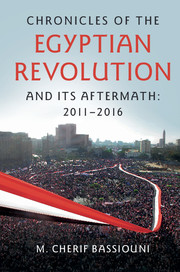Book contents
- Frontmatter
- Dedication
- Contents
- Preface
- Acknowledgments
- List of Abbreviations
- Introduction
- 1 The Early Stage of the Revolution
- 2 Mubarak Relinquishes the Presidency and the SCAF Assumes Power
- 3 A Prelude to Democracy: 2011–2012 Elections
- 4 The Morsi Presidency: June 30, 2012 to July 3, 2013
- 5 The Military's Return to Power and the El-Sisi Presidency
- 6 2015Legislative Elections and the Changing Civilian Political Landscape
- 7 The Military Institution: Its Power, Influence, and Culture
- 8 Violence and Repression
- 9 The Accountability Gap
- 10 The Justice System in Crisis
- 11 The Constitutional Quagmire
- 12 Demographics, Education, and the Economy
- 13 Geopolitical Factors
- 14 Concluding Assessment
- Pictures of the Egyptian Revolution and Related Events
- Bibliography
- Index
13 - Geopolitical Factors
Published online by Cambridge University Press: 24 November 2016
- Frontmatter
- Dedication
- Contents
- Preface
- Acknowledgments
- List of Abbreviations
- Introduction
- 1 The Early Stage of the Revolution
- 2 Mubarak Relinquishes the Presidency and the SCAF Assumes Power
- 3 A Prelude to Democracy: 2011–2012 Elections
- 4 The Morsi Presidency: June 30, 2012 to July 3, 2013
- 5 The Military's Return to Power and the El-Sisi Presidency
- 6 2015Legislative Elections and the Changing Civilian Political Landscape
- 7 The Military Institution: Its Power, Influence, and Culture
- 8 Violence and Repression
- 9 The Accountability Gap
- 10 The Justice System in Crisis
- 11 The Constitutional Quagmire
- 12 Demographics, Education, and the Economy
- 13 Geopolitical Factors
- 14 Concluding Assessment
- Pictures of the Egyptian Revolution and Related Events
- Bibliography
- Index
Summary
THE INFLUENCE OF GEOGRAPHY AND ANCIENT HISTORY
Egypt's geographic location, population composition, and history have all determined the nation's character, from its customs and mores to its strategic importance in the region and beyond.
Located at the northeastern tip of the African continent, Egypt's borders form almost a perfect square totaling slightly more than 1 million square kilometers. Its boundaries are the Mediterranean Sea to the north; the Red Sea, the Gaza Strip, and Israel to the east; the desert and a vast marsh area separating Egypt from Sudan to the south; and, to the west, a large portion of desert separating Egypt from Libya.
This geographical position has long ensured Egypt's protection and insularity, while the Nile has long ensured its economy. Cutting across the eastern half of the country from south to north, the Nile parallels the Red Sea until it reaches Cairo. It then splits into a delta with two branches, one ending at Rashid, near Alexandria, to the west and the other at Damietta to the east, which is close to Port Said and the northern end of the Suez Canal. Both branches of the Nile feed into the Mediterranean. Its delta is shaped like a lotus, a symbol of pharaonic times.
The Egyptian people have inhabited the land adjacent to the Nile and in the Delta area for several thousand years. Even in the twenty-first century, more than 90 percent of the Egyptian population still inhabits the same areas on the banks of the Nile. Some ninety million people live on six percent of the land. The rest is essentially uninhabited desert, waiting to be developed.
Recorded history shows the unification of Upper and Lower Egypt under one pharaoh, Mena, in 3150 BCE. Since then, Egyptians have been united and relatively secure within their natural geographic borders, even though that did not always offer strategic protection from foreign invasion.
After unification, Egyptian pharaohs ruled this unified Egypt through a centralized system from 3150 BCE to 525 BCE, when the last native dynasty fell to the Persians. The Greeks then replaced the Egyptians as rulers of the land under Alexander the Great, though they adopted traditional pharaonic dress and practices. They founded the city of Alexandria in 332 BCE.
- Type
- Chapter
- Information
- Publisher: Cambridge University PressPrint publication year: 2016



